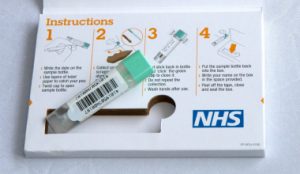
Screening can help doctors find and treat several types of cancer early, before they cause symptoms. Early detection is important because when abnormal tissue or cancer is found early, it may be easier to treat. By the time symptoms appear, cancer may have begun to spread and be harder to treat. Screening refers to the use of simple tests across a healthy population to identify those individuals who have a disease, but do not yet have symptoms.
WHY IS SCREENING IMPORTANT
Screening is a way of finding out if people are at higher risk of a health problem, so that early treatment can be offered or information given to help them make informed decisions.
Screening is a way of identifying apparently healthy people who may have an increased risk of a particular condition. The NHS offers a range of screening tests to different sections of the population.
If you get a normal result after a screening test, this means you are at low risk of having the condition you were screened for. This does not mean you will never develop the condition in the future, just that you are low risk at the moment.
If you have a higher-risk result it means you may have the condition that you’ve been tested for. At this point, you will be offered further tests to confirm if you have the condition. You can then be offered treatment, advice and support.
Early detection is important because when abnormal tissue is found early, it may be easier to treat. By the time symptoms appear, cancer may have begun to spread and be harder to treat. Several screening tests have been shown to detect cancer early and to reduce the chance of dying from that cancer.
Importance of early diagnosis means actions can be taken to:
- Gain access to information, resources and support.
- Clarify and understand your medical condition
- Maximise your quality of life.
- Benefit from treatments.
- Plan for the future.
- Explain to your family, friends and colleagues what has changed in your life.
Breast Screening
 Breast screening is offered to women aged 50 to 70 to detect early signs of breast cancer. Breast screening involves having an X-ray at a special clinic or mobile breast screening unit. This is done by a female health practitioner. Breast screening aims to find breast cancers early. It uses an X-ray test called a mammogram that can spot cancers when they’re too small to see or feel. Women 55 and older will require mammograms every 2 years. For more information please visit : Brest Cancer Screening
Breast screening is offered to women aged 50 to 70 to detect early signs of breast cancer. Breast screening involves having an X-ray at a special clinic or mobile breast screening unit. This is done by a female health practitioner. Breast screening aims to find breast cancers early. It uses an X-ray test called a mammogram that can spot cancers when they’re too small to see or feel. Women 55 and older will require mammograms every 2 years. For more information please visit : Brest Cancer Screening
Cervical Screening
 Cervical cancer screening using is a test to help prevent cancer. All women and people with a cervix aged 25 to 64 should be invited by letter to make an appointment with the practice nurse. This is offered every 3 years for those aged 26 to 49, and every 5 years from the ages of 50 to 64.
Cervical cancer screening using is a test to help prevent cancer. All women and people with a cervix aged 25 to 64 should be invited by letter to make an appointment with the practice nurse. This is offered every 3 years for those aged 26 to 49, and every 5 years from the ages of 50 to 64.
Cervical screening checks the health of your cervix. The cervix is the opening to your womb from your vagina. During cervical screening, a small sample of cells is taken from the cervix and checked under a microscope for abnormalities. Cervical screening helps prevent cervical cancer from developing and saves thousands of lives every year in the UK. For further information please follow link: Cervical-Screening
Bowel Screening
 All men and women aged 60 to 74 who are registered with a GP in England are automatically sent a bowel cancer screening kit every 2 years. The bowel cancer screening test for people aged 60 or over is a kit that is sent to the home address. This is used to check for tiny amounts of blood in your poo. It does not diagnose bowel cancer, but it’s a simple way to find out if you need further tests.
All men and women aged 60 to 74 who are registered with a GP in England are automatically sent a bowel cancer screening kit every 2 years. The bowel cancer screening test for people aged 60 or over is a kit that is sent to the home address. This is used to check for tiny amounts of blood in your poo. It does not diagnose bowel cancer, but it’s a simple way to find out if you need further tests.
To collect a sample:
Catch your poo using toilet paper or a container. Twist the top of the test to open it – the lid of the test has a stick attached. Take a small sample of poo using the stick place the lid of the test and close. Flush the toilet paper or bag and bin any container used send it through the post to the laboratory For further information follow the link Bowel Cancer – Home Test.
Abdominal Aortic Aneurysm
Abdominal aortic aneurysm (AAA) screening is a way of checking if there’s a bulge or swelling in the aorta, the main blood vessel that runs from your heart down through your tummy. This bulge or swelling is called an abdominal aortic aneurysm, or AAA
AAA screening is offered to men during the screening year that they turn 65. Men aged 65 and over are most at risk of AAAs, and screening can help spot a swelling in the aorta at an early stage. he AAA screening test is a quick and painless ultrasound scan of the abdomen (tummy).
Any women, or men under 65 who think they are at higher risk – if the patient has a family history of the condition they can talk to their GP about the possibility of having a scan outside the screening programme. The man lies down on a table and lifts up or unbuttons his top.
The scanning technician rubs a clear gel on the tummy and moves a small handheld scanner over the skin – pictures from the scanner are shown on a monitor and the technician measures how wide the aorta is. The technician wipes away the gel and the man pulls down or buttons up their top. The technician tells the man his screening result straight away. The whole test usually takes about 10 to 15 minutes.
For more information please follow the link Abdominal Aortic Aneurysm.
Children’s Speech and Language Therapy
If your child is registered with a Coventry GP they can be referred to our service. Anybody can make a referral on behalf of a child including parents/carers, teachers, other health professionals, consultants, GP’s and Health Visitors.
Professionals referring on behalf of a parent must obtain the parent/carer’s signature, before the form is sent to us. A referral without parent / carer signature will not be accepted.
For most children, activities to support communication must be carried out before a referral is made to the service. The referrer will be asked to provide details of this support when filling out the referral form. If this information is not provided, the referral will be returned. Look at the referral form for more information about this.
For more information please follow the link www.coventrychildrensslt.co.uk
POSTER: CWPT NHS Children’s Speech and Language Therapy Online – Poster
